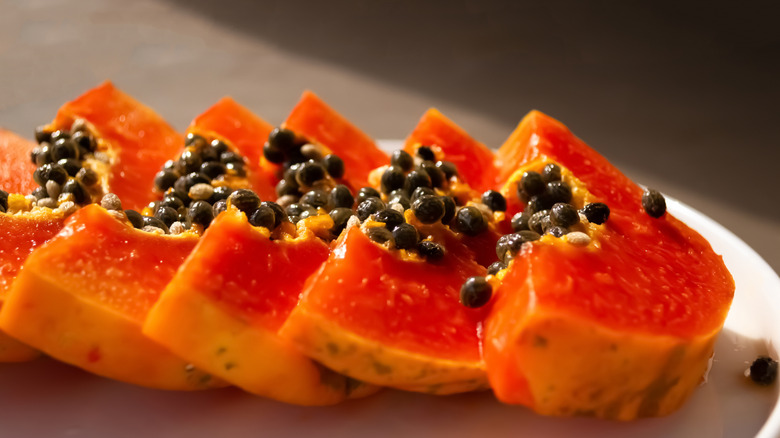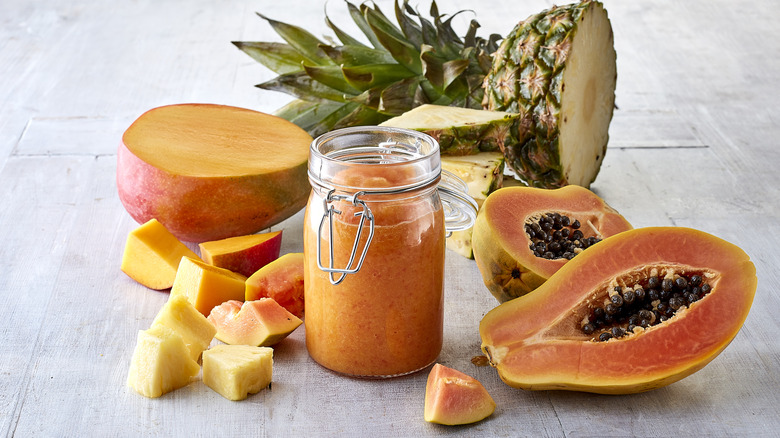
These days, fruit often gets a bad reputation, especially with the rise of keto and low-carb diets. Yes, some fruits are rich in natural sugars, but they also offer essential fiber that helps mitigate those feared blood sugar spikes. Additionally, fruit is an excellent source of vitamin C, a potent antioxidant that combats oxidative stress and inflammation, two primary contributors to chronic disease.
While fruits like apples, oranges, and bananas typically take center stage, don’t forget about tropical papaya. With only 62 calories per cup, papaya is a waistline-friendly choice that provides nearly an entire day’s worth of vitamin C. It also offers a healthy dose of folate to promote healthy cell growth. If you’re lacking sleep, papaya’s 30 milligrams of magnesium can help you meet your daily magnesium needs.
An essential nutrient in papaya is lycopene. Lycopene gives papaya its vibrant color and cancer-fighting properties. While tomatoes are often celebrated for their lycopene content, papayas are quite noteworthy as well. That same cup of papaya contains 2.65 milligrams of lycopene, which compares favorably to the 3.7 milligrams found in tomatoes.
Papaya’s Cancer-Fighting Nutrients

Lycopene is a powerful antioxidant that is even more effective than beta-carotene at neutralizing free radicals, according to a 2022 systematic review in Nutrients. Lycopene can also act as a pro-oxidant, aiding the body in clearing out damaged cells. While some studies have shown mixed results, many have found that lycopene reduces the risk of dying from prostate cancer and helps slow its recurrence. Lycopene has also been shown to enhance the effects of chemotherapy, improve quality of life, and reduce urinary symptoms in individuals with prostate cancer. Lycopene may even help stabilize PSA (prostate-specific antigen) levels, a common marker of prostate cancer. Additionally, people who consume lycopene-rich diets have a higher likelihood of surviving cancers of the head and neck.
But papaya offers more than just lycopene. A 2024 review in the Journal of Cancer Prevention found that papaya contains carpaine and capsaicin, two alkaloids that can help prevent cancer and slow tumor growth. Papaya also contains saponins that interfere with cancer cell DNA and tannins that neutralize harmful reactive oxygen species (ROS) that can lead to cancer. Additionally, papaya is rich in flavonoids like quercetin and kaempferol, which help reduce inflammation in the body.
Unique Ways to Enjoy Papaya

You can enjoy fresh, ripe papaya in a bowl with a squeeze of lime juice or topped with some toasted coconut. Frozen papaya is an excellent addition to smoothies, providing extra fiber and antioxidants. For a juicy summer treat, cut a papaya in half and place it cut-side down on the grill. After a few minutes, flip it over, sprinkle it with minced ginger and a drizzle of honey, and continue grilling until it’s warm and caramelized.
Have an unripe green papaya? You don’t need to wait for it to ripen to benefit from its nutrients. In fact, green papaya contains more fiber, magnesium, lycopene, and vitamin C than its ripe counterpart. Simply peel the outer skin with a vegetable peeler, shred the flesh, and add it to salads for a refreshing crunch (but beware of the side effects of unripe papaya). Don’t discard the seeds either. They have a peppery flavor and can be used as a spice (though eating papaya seeds won’t eliminate parasites).
You might also want to explore fermented papaya for its additional health benefits. It’s made by fermenting papaya in a glass jar with coconut water kefir for 24 hours. According to a 2022 review in Foods, fermented papaya may help protect the brain from Alzheimer’s by reducing beta-amyloid buildup and oxidative stress. It may also help alleviate skin allergies, support gut health, improve cholesterol, and regulate blood sugar.




